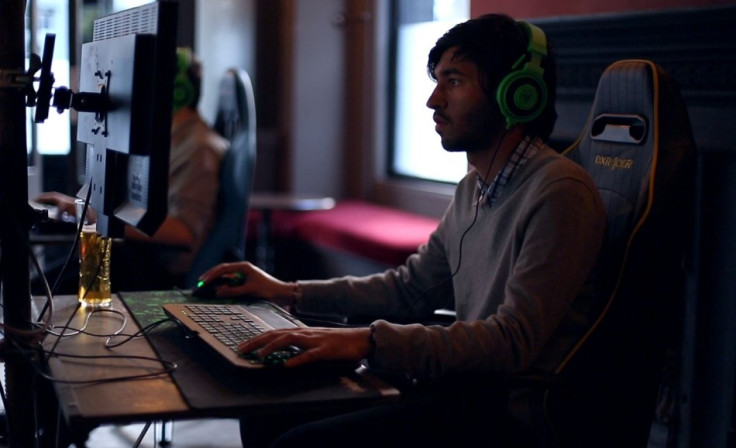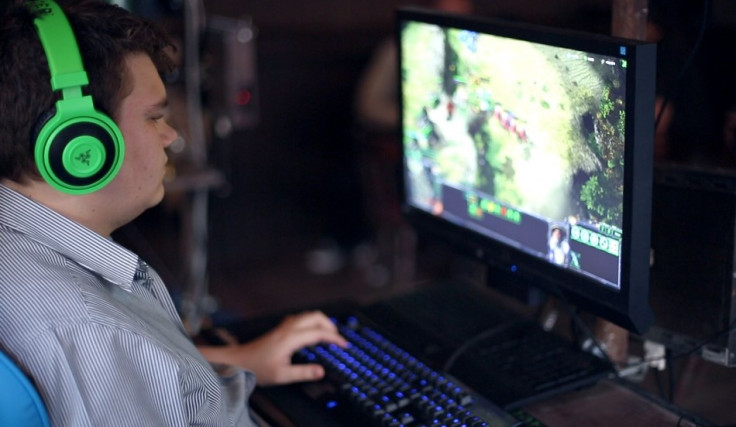Inside E-Sports - The World of Professional Gamers [VIDEO]
We take a look into the world of e-sports, where professional videogame players compete in leagues, tournaments and live events to win big money prizes.

What if I told you you can make hundreds of thousands of pounds playing videogames? "Sure", you might scoff "and the moon's made of cheese and the streets are paved with gold, and Nick Grimshaw is a likeable presenter. What hokum!" No, but really, you can.
You might not have heard of electronic sports or "e-sports." Though they're big in South Korea, Sweden and the US, they have not really cropped up in the UK yet, with British people still preferring to play, I dunno, cricket. But they're on the rise. Kicking off in the mid-nineties with events like QuakeCon, competitive videogaming is now a professional sport, complete with global tournaments, regulatory bodies and corporate sponsorship.
Games vary from country to country. South Korean leagues are dominated by Starcraft II, a turn-based sci-fi strategy game that requires forward planning and a lot of patience. The US and Nordic leagues are more straightforward, focused around first-person shooters like Call of Duty (CoD) and, to a lesser extent, Counter Strike.
Spectators
What doesn't vary, though, is the money involved. When I said hundreds of thousands, I wasn't exaggerating. Matt Morello, former professional Call of Duty player and now coach of a four-man Black Ops 2 team called "Complexity", told me more:
"Currently, all the Complexity players make enough money to live off this. They're in college, and with their tournament wins, they make enough so that Call of Duty is their main job.

"Recently, we won GFinity in London, which had a first place of $30,000. MLG Anaheim which we also won was $20,000. The CoD championship which is held every year has a million dollar prize purse, so first prize is $400,000 to $100,000 each. Good money, right?"
And it's not just prize pots that professional gamers can earn. Though competitive gaming tournaments have existed for a while, what's developing now is the spectator side, with more and more fans attending tournaments or following them via live streams.
Meltdown
Duncan Morrison is the co-founder of Meltdown, a newly opened bar on London's Caledonian Road. Though it's themed around e-sports, there are only two interactive game stations on site. Morrison says the spectating aspect of e-sports is a big enough draw:
"We wanted Metldown to be more like a pub. We have a weekly schedule: Dota 2 on Tuesday; fighting games on Wednesday; Thursday and Friday are Starcraft 2 and then weekends we show whatever big event is happening. A lot of these games are now being designed with the spectator in mind. There are a lot of people who maybe play casually but watch seriously.
"People enjoy playing football, but then they also enjoying watching the best people play football. It's no different in e-sports; games are fun to play but also fun to watch at the highest level."
Sponsors
Advertisers, hardware makers and big labels have responded in kind. If you can draw a crowd playing e-sports, you can also pull in some corporate money, either by streaming yourself playing and charging for advertising minutes or by bringing your fanbase with you to large, sponsored events.

"If you're funny or interesting you can make a lot of money from streaming," explains Morrison. "Computer makers and peripheral makers like Razer and Logitech are big sponsors. Energy drinks are also popular, like Red Bull and Monster."
"Sponsors for US events include Dr Pepper, Flips and Turtle Beach," continues Morello. "Smaller events vary, but the sponsors usually provide the prize money.
"With Dr Pepper, they have a booth at the event where they give away free Dr Pepper, or where they take photos of the pro-teams and post them online. With Turtle Beach on the other hand, all the amps at the event will be Turtle Beach amps, so the idea is people will get used to using the hardware then go out and buy some. It's for exposure."
Players
So the spectators are there and the sponsors are hungry, but how do game tournaments work if you're a player?
"Getting into e-sports is pretty easy," says Morello. "You meet people online via a website called GameBattles, join a team or post on the forums and then start playing online. You can also go along to tournaments or events, which are held all over the US.
"For Black Ops II, competitive matches are four on four and it's a best of five series. At a tournament, I'll set up our schedule of when to get up and warm up. In-game, I keep track of other things happening that the players might not be paying attention to, for instance in capture the flag where I'll have an eye on opponents we haven't accounted that might be sneaking up behind. I also keep morale up - after losing a big game in front of a crowd it's easy to let that drown you out."
There are also plenty of rules, regulations and adjudicators in place to make sure everyone plays fair; though the tournament set-up varies from videogame to videogame, certain standards apply across all e-sports.
"There's always an offline finals component to any tournament," explains Morrison. "It provides the most level playing field, so there are no technical problems. That will always be the gold standard; there's no online tournament that can compete in terms of prestige."
Morello adds: "We're working on a universal Call of Duty rule set right now to ensure things are the same everywhere. Right now the standard is no C4, no rocket launchers. Keep it to guns, concussion grenades, sidearms and grenades. We also have referees at events to make sure people aren't using glitches or exploits, or to make sure people aren't talking trash to one another."
Genuine
Without wanting to sound like a patronising outsider, it needs stressing that e-sports are genuine. To the uninitiated, they might sound a bit lax and whacky - when I first heard about the amount of money professional gamers made, I reacted like my dad when I told him I wanted to study films, all mock, outraged incredulity. But people don't become professional videogamers for no reason. As Morello concludes, skill and resilience are needed in equal measure:
"The best players have to have a strong mind to keep up with the pace of the game and not get pressured. You need very good hand-eye coordination and quick reflexes, as well as intelligence and decision making. Players have to take time off from just getting burned out. You have to play for days, weeks, years."
If you want to make a killing from competitive gaming, the UK Pro League, a British Starcraft division, has just opened up. If you watch enough live events, pick up some tips and spend hours every day drilling the game into your head, you might just have what it takes to earn some of that sweet gaming money.
© Copyright IBTimes 2025. All rights reserved.






















